6 Healthiest Instant Ramen Noodles—and 5 To Avoid
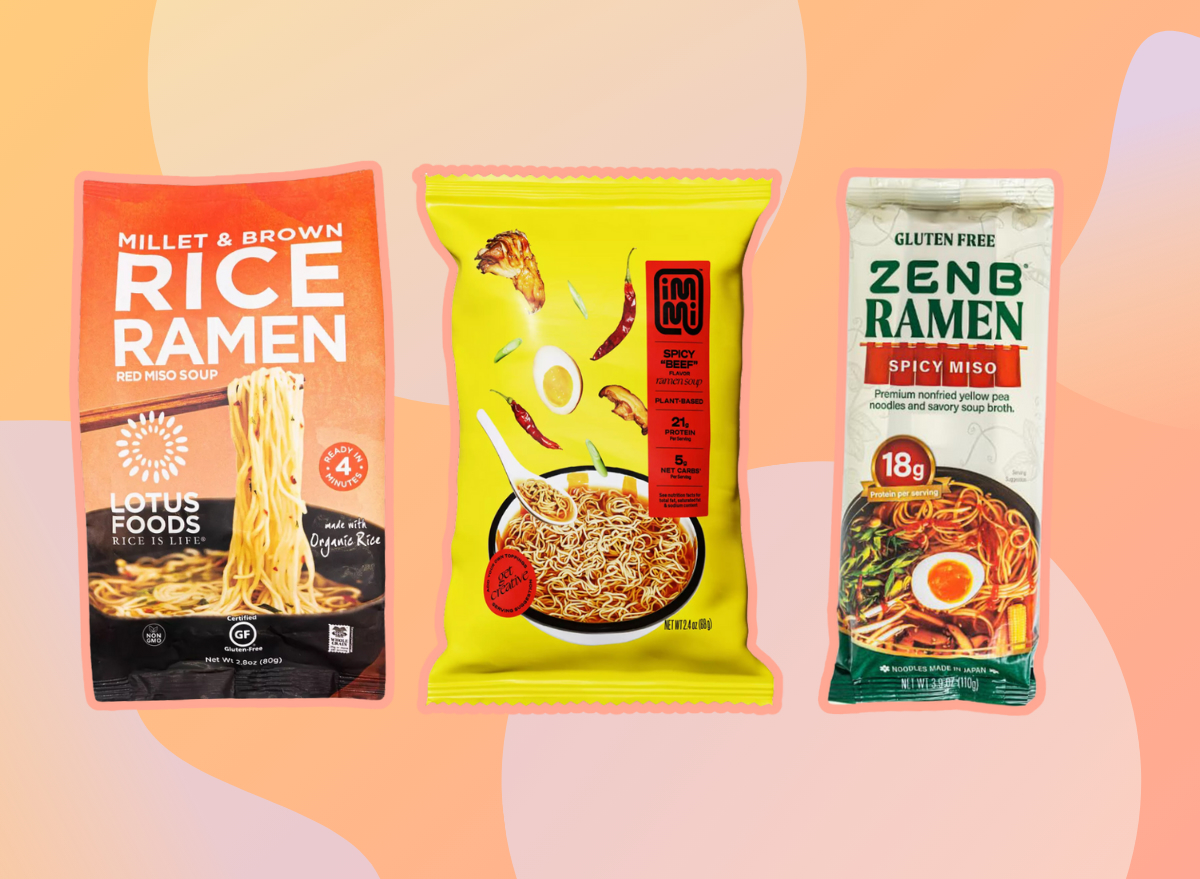
Ramen is undoubtedly delicious, but instant varieties often fall short nutritionally, and some contain a large number of questionable ingredients. However, there are packaged options that tone down the questionable additions without sacrificing taste. Ramen lovers will appreciate knowing which instant ramen noodles are the healthiest and unhealthiest, and we’ve gathered this information with the help of a nutritional expert.
How We Chose the Healthiest Instant Ramen Noodles
To help you shop for the best healthy ramen noodles, registered dietitian Catherine Gervacio, RDN, a contributor to Living.Fit, gave us these five benchmarks:
- Made from Whole Grain or Whole Wheat Flour: “Healthy ramen noodles can be made from whole grain or whole wheat flour,” Gervacio says. “These provide more fiber and nutrients compared to refined flour noodles.”
- Contains Dehydrated Vegetables: These add fiber, vitamins, and minerals to the meal, enhancing its nutritional value.
- Relatively Low in Sodium: Ideally, the sodium content should be less than 600 milligrams per serving, according to Gervacio, as high sodium intake is linked to various health issues.
- Relatively Low in Calories: Lower-calorie options help maintain a balanced diet.
- Low in Fat: “The fat content of unhealthy instant ramen can raise cholesterol levels and contribute to heart disease,” Gervacio tells us while saying, “Avoid ramen products with high levels of saturated fat and trans fats.”
With these criteria in mind, Gervacio helped us identify the best healthy instant ramen options and the ones you should avoid. Read on for our top picks, and for more, don’t miss I Tried 8 Instant Ramen Brands & the Best Was Rich & Creamy.
Best Instant Ramen Noodles
Immi Spicy ‘Beef’ Ramen
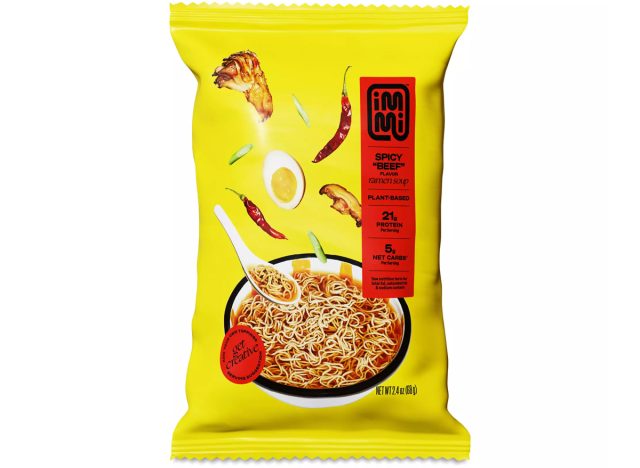
Calories: 300
Fat: 14 g (Saturated Fat: 7 g)
Sodium: 890 mg
Carbs: 24 g (Fiber: 19 g, Sugar: 1 g)
Protein: 21 g
Immi’s Spicy “Beef” Ramen is among the healthiest options on store shelves because it contains a moderate sodium level and boasts over 20 grams of protein and 19 grams of fiber. That’s 67% of your daily recommended intake of fiber! For those who need to keep an eye on their weight, Gervacio also points out that 300 total calories is a good number for a meal.
Lotus Foods Organic Millet & Brown Rice Ramen Noodles with Red Miso Soup
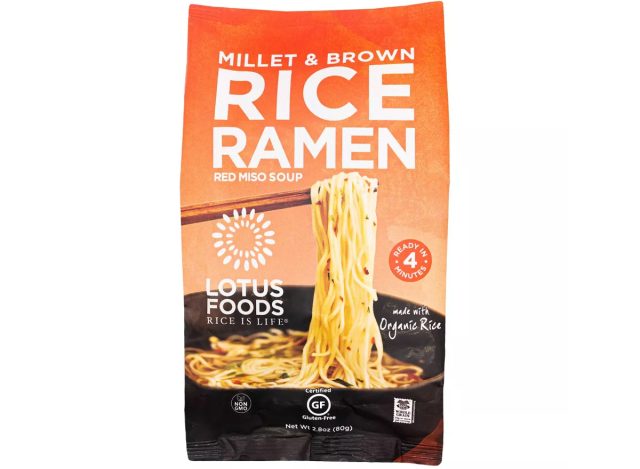
Calories: 140
Fat: 1.5 g (Saturated Fat: 0 g)
Sodium: 590 mg
Carbs: 25 g (Fiber: 2 g, Sugar: 5 g)
Protein: 10 g
Lotus Foods Organic Millet & Brown Rice Ramen with Red Miso Soup “is very good for those who are looking for gluten-free alternatives,” Gervacio says. The noodles in Lotus Foods’ Ramen are made of specialty brown rice, which a study published in the February 2013 issues of Critical Reviews in Food Science and Nutrition found to be healthier than white rice. Gervacio explains that when it comes to the Organic Millet & Brown Rice Ramen, “It has a low sugar, carbohydrate, and fat content, but the amount of protein is somewhat low.” Because of that, “a serving of lean proteins can be considered when eating these noodles. Also, it has a low fiber content, so adding vegetables is optimal.”
ZENB Ramen Noodles
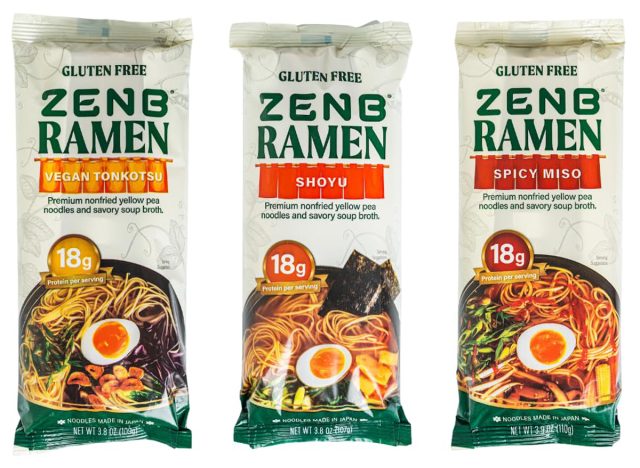
Calories: 360
Fat: 5 g (Saturated Fat: 1 g)
Sodium: 880 mg
Carbs: 61 g (Fiber: 12 g, Sugar: 7 g)
Protein: 18 g
ZENB Ramen noodles ditch refined flour and are instead made from 100% yellow peas, resulting in instant ramen packed with 18 grams of protein and 11-12 grams of fiber. Each pack of healthy ramen noodles is paired with a packet of umami-packed broth in three flavors: Spicy Miso, Shoyu, and Vegan Tonkotsu.
WhatIf Foods BAMnut Noodle
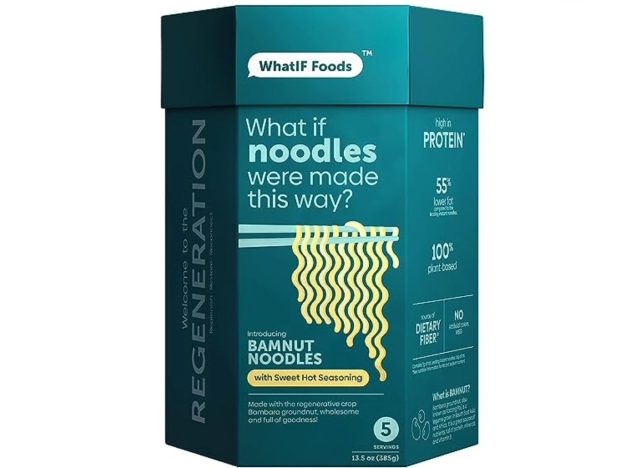
Calories: 300
Fat: 7 g (Saturated Fat: 3 g)
Sodium: 720 mg
Carbs: 42 g (Fiber: 6 g, Sugar: 7 g)
Protein: 17 g
“These noodles offer a different and healthier take to wheat-based ones,” Gervacio says while discussing WhatIf Foods BAMnut Noodle. An option that can often be seen in Asian noodle dishes, a study published by the Cereal Chemistry journal in August 2018 noted that whole wheat noodles can offer both a satisfying eating experience as well as one that’s nutritious. Gervacio adds, “These are good options for those who have certain sensitivities to gluten. It is also vegan-friendly which means it contains no cholesterol. Also has lower sodium content than immi.”
Public Goods Original Ramen Noodles
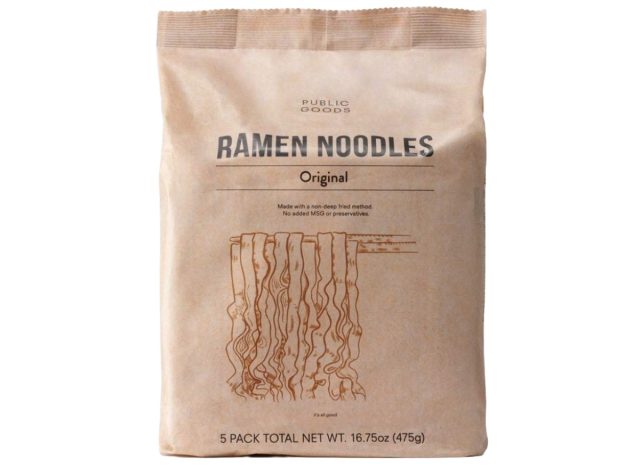
Calories: 290
Fat: 3 g (Saturated Fat: 0.5 g)
Sodium: 1,510 mg
Carbs: 58 g (Fiber: 2 g, Sugar: 7 g)
Protein: 10 g
Gervacio first points out that among the healthy options, Public Goods Original Ramen Noodles “has the highest sodium content of 1,510 milligrams per serving, which accounts for 66% of the total recommended daily intake,” per the United States Food and Drug Administration (FDA). However, she also tells us that “it has a reasonable number of calories,” is “low in fat,” and includes protein as well as “moderate carbohydrates,” which means that it’s still a better choice than the worst options on this list.
Vite Ramen
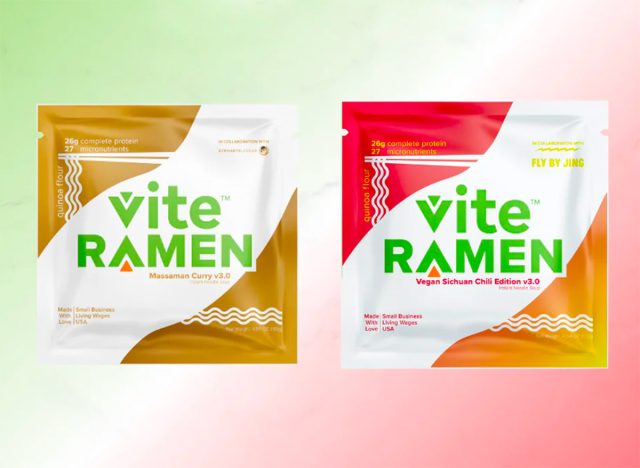
Calories: 450
Fat: 8 g (Saturated Fat: 1.6 g)
Sodium: 1,166 mg
Carbs: 68 g (Fiber: 7 g, Sugar: 2 g)
Protein: 26 g
Vite Ramen lets you indulge in healthy ramen noodles by serving up an impressive 26 grams of protein and 7 grams of fiber. Although it is a bit high in sodium at 1,116 milligrams, it’s still lower in sodium than many ramen brands.
Worst Instant Ramen
Worst: Nissin Top Ramen Soy Sauce Flavor
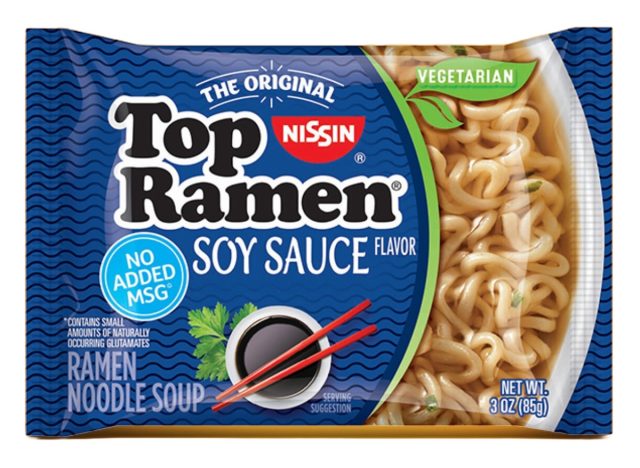
Calories: 380
Fat: 14 g (Saturated Fat: 6 g)
Sodium: 1,620 mg
Carbs: 53 g (Fiber: 2 g, Sugar: 0 g)
Protein: 9 g
Although Nissin Top Ramen Soy Sauce Flavor is appropriate for vegetarians and anyone who stays away from meat, while also claiming to have a reduced sodium content and no added MSG, it still has quite a bit of sodium at 1,620 milligrams. That’s not to mention that it has 380 calories which is 80 calories more than a McDonald’s cheeseburger, 50 more calories than the Subway Veggie Delite® wrap, and 20 calories more than a Chalupa Supreme® from Taco Bell.
Worst: A-Sha Meteor Noodles with Braised Beef Sauce
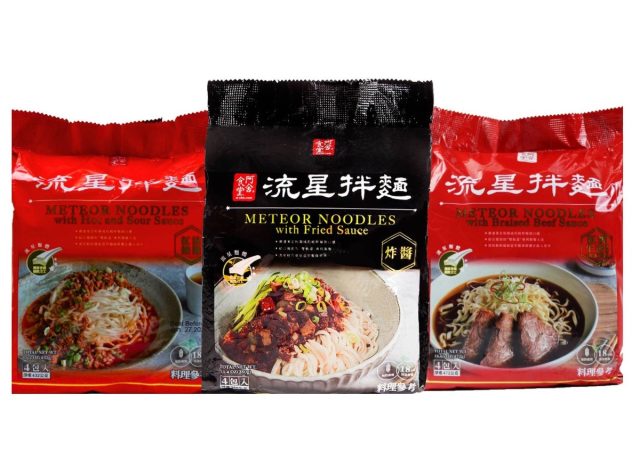
Calories: 390
Fat: 9 g (Saturated Fat: 4 g)
Sodium: 2,000 mg
Carbs: 65 g (Fiber: 3 g, Sugar: 6 g)
Protein: 12 g
A-Sha Meteor Noodles with Braised Beef Sauce is made with “a one-of-a-kind ramen noodle” that will apparently “elevate your ramen experience.” Granted, it does so with 390 calories and 2,000 milligrams of sodium which means that the salty content of Meteor Noodles and Braised Beef Sauce is out of this world, and not in a good way.
Worst: Myojo Premium Shio Tonkotsu Ramen
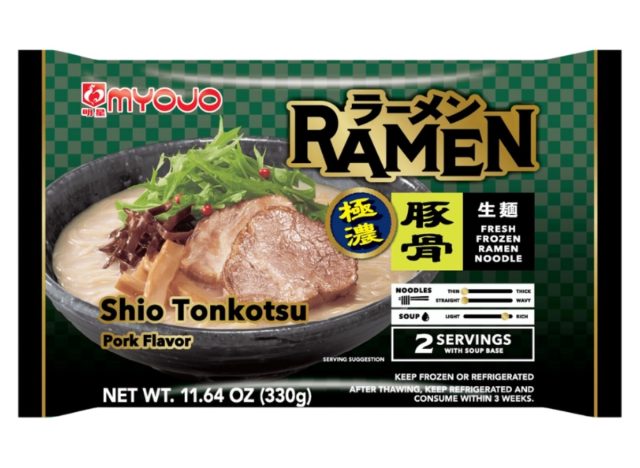
Calories: 400
Fat: 7 g (Saturated Fat: 2 g)
Sodium: 3,150 mg
Carbs: 67 g (Fiber: 2 g, Sugar: 3 g)
Protein: 12 g
Myojo Premium Shio Tonkotsu Ramen offers a creamy pork broth along with toppings like chashu, kikurage mushroom, and seasoned bamboo. Unfortunately, this ramen dish also has 400 calories. Granted, that can’t compare to the fact that it also has a whopping 3,150 milligrams of sodium which is obviously way too much for one meal let alone a single ramen dish.
Worst: Sanyo Foods Sapporo Ichiban Shio Ramen
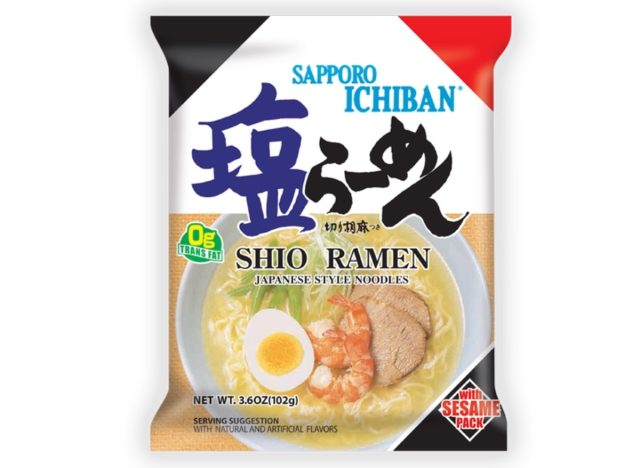
Calories: 460
Fat: 18 g (Saturated Fat: 8 g)
Sodium: 2,140 mg
Carbs: 64 g (Fiber: 4 g, Sugar: 3 g)
Protein: 9 g
Sanyo Foods Sapporo Ichiban Shio Ramen tries to win you over with the fact that it’s trans-fat-free and achieves its flavor with the help of the “natural sweetness and flavor of vegetables” that are meant to be added to the “refreshing clear soup.” However, you shouldn’t overlook the fact that it also has 460 calories and 2,140 milligrams of sodium.
Worst: Samyang Ramen
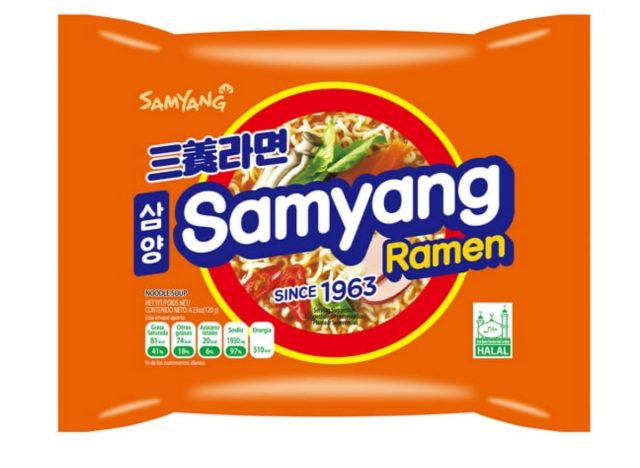
Calories: 510
Fat: 17 g (Saturated Fat: 9 g)
Sodium: 1,930 mg
Carbs: 78 g (Fiber: 0 g, Sugar: 5 g)
Protein: 10 g
Samyang Ramen has apparently been around and providing those who adore this dish with “heartwarming rich broth and deliciously bouncy noodles” since 1963. Yet, in all of those years, they haven’t seemed to come up with a recipe that’s on the healthier side. Instead, the ramen includes 510 calories and 1,930 milligrams of sodium.









